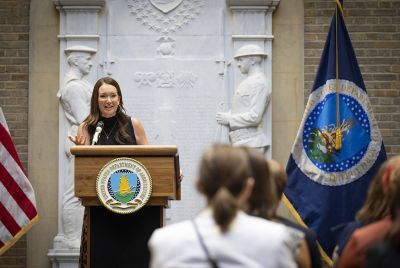Interview: Are free schools the way forward?
Jeanne Allen is the Founder and President of The Center for Education Reform (CER), a national advocacy organization started in the Washington, DC metropolitan area. CER is dedicated to creating better educational opportunities for children and families in the United States.
IBTimes: Why are you visiting Britain?
Jeanne Allen: I was in town to address a group called the 100 Group of state and independent school heads. I was quite impressed actually with what they were doing.
IBT: Is it run or funded by the government?
JA: No. I think it might be supported in part by the government but it's not so much an organisation, it's more of a get together every year or so.
It's a collection of the 50 leading state school heads and 50 independent school heads. They were encouraged originally to get together by the government but they continued to do so on their own in order to collaborate and learn from each other.
IBT: So the hostility between state and private schools is a bit of a myth then?
JA: It is. I did not see that at all. It was interesting because I was actually struck by how they are much more competitive than in the US, where they are frankly often hostile to each other.
In the US there is less collaboration between public, private and charter schools. These folks at the 100 Group were not only uniformly interested in high quality and great achievement but in the broader picture. The theme of the conference was "Is Britain falling behind?".
That's usually the kind of thing you hear from outside education in the states. You don't hear educators themselves get together and ask if America is falling behind. So I was actually quite impressed and we in America could learn something from the acceptance and the acknowledgement that great education is critical and should be addressed by educators themselves.
IBT: What kind of things could independent and state schools learn from each other?
JA: I guess the most important thing they seemed to believe they could learn from one another is how to really address the issue of teacher quality. They also acknowledged the call from some headmasters that they should operate as CEOs. They should be aggressive and bold and unflinching in their demand.
IBT: Would that also be to a view to increasing competition between schools?
JA: Well yes there was a lot of discussion about increasing competition and how they can get these new academies here get off the ground. I was here to talk about charter schools which are between your academies and your free schools. They are a lot more advanced in terms of freedom and flexibility. Your academies are more like what we would call conversion charter schools in that they start as a state school. Then your free schools are more like our start up charters.
IBT: So you are broadly in favour of free schools and academies?
JA: Yes. In fact the other thing they agreed on at the conference was on the impact of economy and flexibility. Charter schools feel the reason they could be successful is that they have had an enormous amount of autonomy to manage their schools, spend money and to implement their programme.
Economy is of course central in theory to the academy and free school idea. It's not entirely clear that the academies do truly exercise the kind of autonomy that our charter schools do. Our business model is that these are independent public businesses that have wide autonomy from their local authority.
That's not necessarily happening here but there is a uniform agreement that good schools do not just have high quality teachers but also a high degree of autonomy and flexibility and that's from looking at schools in the US, in Finland and in Singapore.
IBT: What about concerns that teachers will lose rights, for example union representation at free schools and academies?
JA: Yes this is the hallmark of the charter school movement that most unions are not mandatory but are optional and it should be the same here in Britain. You will of course expect the public sector and teachers unions to oppose something that takes them out of control. If you are going to have autonomy and flexibility and hold heads and teachers to account you need flexibility from labour. We believe these kind of labour issues are dated in terms of their need and what brought them into existence to begin with. We are sort of post-union. We need to be a lot more focused on student achievement and quality people and often quality people are anathema [to unions].
IBT: There was a story recently that only 18 teachers were sacked in the last 40 years for incompetence. Is it similar in US?
JA: That's exactly right and we have similar horror stories about how few teachers and even headteachers are let go on a regular basis in the US. That's one of the reasons that 20 years ago charter schools started to begin with - it was to get away from the bureaucracy and these iron clad labour rules that often stood in the way of great teachers and good education.
IBT: Studies show that social mobility is getting worse in Britain is it the same in US?
JA: Well it's kind of stagnant actually and that's why a conversation about education does not take place without some sense of economic competitiveness and global competitiveness. Our middle class is being squished and the attainment of those on low incomes and people of colour is not increasing as dramatically as it has in the past. All this can be laid at the feet of our schools for not encouraging children or requiring high expectations. The schools which do encourage and have high expectations are sending kids to college in droves and those that are not don't.
IBT: In Britain the decline in social mobility has been put down by some to the abolition of grammar schools. Is it the same for America?
JA: The one area where it might be comparable is we used to have more K8 schools but then in the '60s there were reforms to introduce middle schools. However these reforms were not to help education but to help children socially and they became unruly schools. People still dread their child going to middle school. In fact middle school is the time when a lot of parents start sending their children to private schools because at middle schools the expectations are not as high and the teachers are led to believe that they are there to nurture and guide adolescents rather than teach them, which is complete rubbish. There has been some evidence that middle schools have changed a lot for the worse.
IBT: Is there a social or ideological stigma or hostility attached to going to private schools?
JA: Only among people in the general education establishment. There is not a hostility per se there's sort of a perception that they are good because they do not have to serve all of the kids, like those from poor backgrounds, yet our private schools relish the opportunity to do so.
IBT: What's the conversion rate of children going to university from private, state and charter schools?
JA: Private schools are much higher and increasingly so are charters. With public schools it's very uneven and depends a lot on the area.
IBT: How common are charter schools?
JA: There are more than 5,000 now and they take up roughly 4% of public schools but they are very unevenly spread. For example in Washington 40 per cent of the kids are in charters. There are lots of them in the inner cities but in traditional areas they are fewer but they are cropping up. There are 5,400 serving about 1.7 million people in 40 states. Around 11 per cent of students are in private schools. So it's still small but its growing. We estimate that the number of students on charter school waiting lists could fill another 5,000 charter schools.
IBT: Do any charter schools have any religious affiliation?
JA: No they are not allowed to. They must be public and they must not charge tuition of any kind. Because they take public money they are required to be non-sectarian due to the first amendment on separation of church and state.
There was an interesting case of a school that wanted to teach Hebrew to people of Hebrew descent however that was challenged as it seemed to be a way of making a Jewish school by the back door.
IBT: Those who campaign for free schools say they get horrendous levels of abuse and opposition, especially from trade unions.
JA: Yes right. The good news is your unions are not nearly as strong as ours. Your advantage over us is that your heads are more highly valued, in terms of their own opinion and leadership than individual teachers. In the US people say we should listen to the teachers but in Britain parents seem to turn to the head's mostly.
IBT: One of the concerns is that free schools will be profit making is this a serious concern?
JA: Charter schools, and I believe it's the same for free schools, are not allowed to make a profit but we can hire outside companies, for example education companies that help parents get the school of the floor. That's important because parents know what they want from education but they are not necessarily the experts. So while schools cannot make a profit obviously the outside companies will be paid for their services.
© Copyright IBTimes 2025. All rights reserved.



















